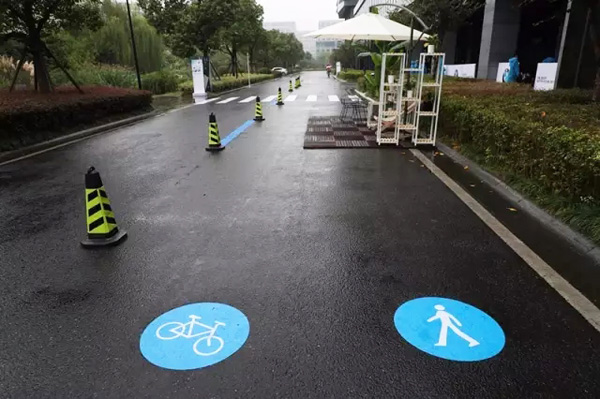
A parking lot planned for shared bicycles and electric motor bikes is pictured in the Zhejiang Hangzhou Sci-Tech City in Hangzhou, Zhejiang province, on Sept 20, 2017. (Photo provided to chinadaily.com.cn)
Young designers, scholars, and university students joined hands with BMW China last week in an experiment to help improve the local traffic situation in an industrial park in Hangzhou city, capital of eastern Zhejiang province.
A group of 10 young people from different countries joined the 2017 BMW Next Mobility Youth Camp, and turned their exploring mobility solutions into real-life situation in Zhejiang Hangzhou Sci-Tech City.
"BMW Next Mobility Youth Camp is an innovative practice to contribute to China's future sustainable mobility," said Olaf Kastner, president & CEO of BMW Group Region China.
He said, "Through this program, BMW is trying to proactively engage itself in the development of Chinese cities with local perspective and practice."
The young group's experiments unleashed the potential in the region, and tackle actual traffic issues, including the vehicles occupying the space for pedestrians.
The solution separated the flows of vehicles, bicycles, and pedestrians, and provided parking areas for shared bicycles and electric motor bikes. The vacant areas were upgraded into leisure areas for the passers-by to take a break, refresh, and communicate with each other.

BMW Reach Now services was also utilized, as the company believes one shared BMW i3 electric car provides transportations to more users and saves 4 parking lots of about 50 square meters.
Hangzhou Future Sci-Tech City is a new urban district that is facing challenges on developing the local mobility system, after experiencing fast development.
A total of 10 solution finalists for Hangzhou Future Sci-Tech City will be displayed in BMW Experience Shanghai, and the grand prize winner will be announced by November.
Supported by the Chinese People's Association for Friendship with Foreign Countries, BMW Next Mobility Youth Camp is 3-year corporate project, initiated in 2016.


















































